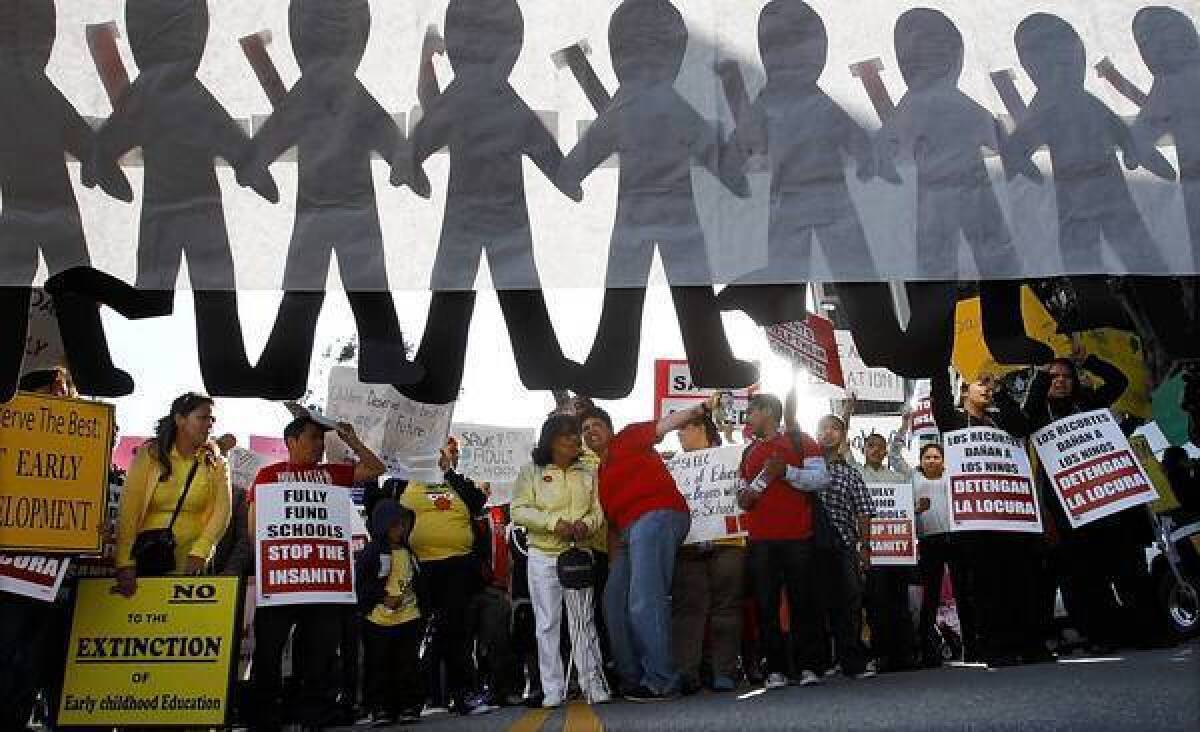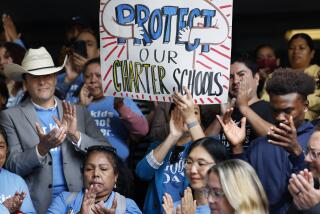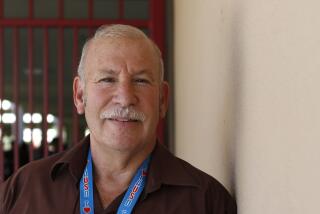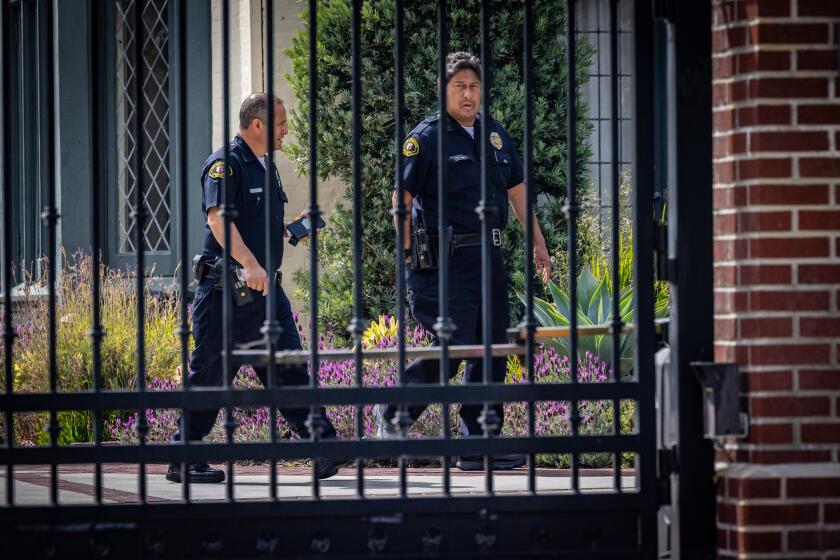Hollywood philanthropist throws a lifeline to L.A. Unified

Cue the violins.
The end of this school year is bound to bring a spate of desperate pleas from people who owe their salvation to programs that are on the chopping block in the cash-strapped Los Angeles Unified School District.
Their stories crowd my inbox: the high school dropout who got a second chance for a diploma, the immigrant who learned enough English to help his daughter with homework, the single mother whose son steered clear of gangs because a teacher unlocked his artistic talent.
Alternative schools, adult education, art teachers on elementary campuses....Those are just a few of the programs being penciled out of a budget that must be cut by more than $300 million.
Do you keep nurses or librarians? Close science centers or early education classes? Every program has its defenders, and every cut is a heartbreaker.
But we don’t have enough money to do it all. And things that we have learned to think of as an educational birthright are likely to disappear this fall.
If you send a kid through public school in California, you grow accustomed to the ritual of budget-cutting. Our state’s boom-and-bust school financing scheme requires us to make our peace with perpetual instability.
But this year’s cuts are unusually deep and feel particularly cruel; a district straining for improvement must settle instead for solvency.
Now schools — encouraged for years to flex their muscles by promises of autonomy — have built their “save us” campaigns around public testimonies.
It’s hard to argue against a student like Billie Jean Poole, who had given up on education until she found North Hollywood’s Amelia Earhart Continuation campus, an alternative education school. “The teachers took time to explain each thing to me....no matter how many times [we] had to redo the same question,” she said.
It’s hard to ignore the hundreds of letters from students at the district’s new arts school. Almost every one begins and ends the same: “The decision to cut elementary art programs is unacceptable....Please do not cut these art programs from the lives of our future generations.”
In between, the young authors explain how the arts have changed their lives — keeping them off the streets, improving their balance, introducing them to origami.
I appreciate the sentiment, but there’s something distasteful about enlisting children to beg for their programs and their teachers.
I’d have liked this assignment better if it required a little mathematical creativity: Where do those students think the district should look for the $18 million it costs to keep elementary school arts teachers?
There is no easy answer to that.
Tax hikes on the ballot this fall would funnel money to public schools, but not enough to bridge the gap between what we need and what we have.
It’s embarrassing that California spends so little on education. We rank 46th among states in our per-student public school spending.
But it’s also disturbing to me how little the corporate and philanthropic worlds have been willing to invest to help.
Beyond a few big-ticket efforts by millionaires to bankroll school reform, public schools in Los Angeles have not benefited much from private largesse.
Private money can’t take the place of state funding and shouldn’t dilute the responsibility. But school districts around the nation are stepping up their reliance on charitable giving to plug holes gouged by the economy.
New York City’s Fund for Public Schools has raised more than $300 million in 10 years from celebrities, charities, corporations and a newly inspired citizenry whose donations have revitalized school libraries, campus performing arts centers and early education programs.
Here? In a city that rivals the Big Apple in wealth and celebrity, we’ve had to cobble together penny ante donations to host a banquet for our national champion Academic Decathlon team.
I’m glad that bothers Megan Chernin. The Hollywood philanthropist, wife of producer Peter Chernin, is heading up an effort patterned after New York City’s to raise $200 million for L.A.’s schools.
She knows it’s not going to be easy. Los Angeles Unified has been labeled a failure and clouded by perceptions of mismanagement. Most people with money and power here don’t send their children to public schools, so they have no stake in the district’s success.
“My own kids went to private school,” Chernin said. She had no idea of the challenges until a stint as a volunteer mentor took her inside schools and into children’s lives, “and I saw such phenomenal need.”
In a district that covers 700 square miles, “it’s hard to feel like we’re a community,” she said. “We all feel like we’re part of something separate. There’s a sort of emptiness to that.
“We’re trying to build a sense of community. You can’t help if you don’t know what others are lacking.”
So far, the new Los Angeles Fund for Public Education has sponsored two projects: a breakfast program that feeds 200,000 students in their classrooms, and a screening of the film “Bully” for 7,000 middle-schoolers.
On the drawing board is a year-long campaign to “reinvent the delivery of arts education in the creative capital of the world,” she said.
“We’re not looking for a way to replace the arts teachers for the district,” Chernin said. “I’m not asking anybody to be the backfill of LAUSD.”
And she’s not handing checks over to the school district. Although Supt. John Deasy is on the nonprofit’s board, the foundation is separate because donors are skittish.
“If I just went in there and said, ‘We’re here to support LAUSD,’ I would get a door slammed in my face,” Chernin said.
“I can’t go to people yet and say the system is turning around....But there are great teachers and principals who need our support. If we can connect the dots with private philanthropy, we can make a real difference in children’s lives.”
That’s a worthy goal, and a tall order in a city that’s learned to tolerate the failure of its public schools — where the legacy of public support seldom goes beyond my kid, my program, my school.
More to Read
Start your day right
Sign up for Essential California for news, features and recommendations from the L.A. Times and beyond in your inbox six days a week.
You may occasionally receive promotional content from the Los Angeles Times.






